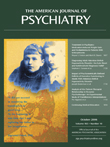Hyperlipidemia Following Treatment With Antipsychotic Medications
Abstract
Objective: This study attempted to estimate the relative risk of developing hyperlipidemia after treatment with antipsychotics in relation to no antipsychotic treatment. Method: A matched case-control analysis was performed with pharmacy and claims data from California Medicaid (Medi-Cal). Patients were excluded if they were treated for medical disorders or prescribed medications known to increase their risk of hyperlipidemia. Cases were ages 18 to 64 years with schizophrenia, major depression, bipolar disorder, or other affective psychoses and incident hyperlipidemia. Cases were matched to up to six control subjects by age, sex, race, and psychiatric diagnosis. Both groups were prescribed either no antipsychotic medication or had two or more prescriptions for one and only one antipsychotic medication during the 60 days prior to the first indication of hyperlipidemia (cases) or matched index date (controls) in the billing record. Conditional logistic regressions were used to derive odds ratios and 95% confidence intervals (95% CIs) of each antipsychotic medication in relation to no antipsychotic medication. Results: A total of 13,133 incident cases of hyperlipidemia were matched to 72,140 control subjects. As compared with no antipsychotic medication, treatment with clozapine (odds ratio: 1.82, 95% CI: 1.61–2.05), risperidone (odds ratio: 1.53, 95% CI: 1.43–1.64), quetiapine (odds ratio: 1.52, 95% CI: 1.40–1.65), olanzapine (odds ratio: 1.56, 95% CI: 1.47–1.67), ziprasidone (odds ratio: 1.40, 95% CI: 1.19–1.65), and first-generation antipsychotics (odds ratio: 1.26, 95% CI: 1.14–1.39), but not aripiprazole (odds ratio: 1.19, 95% CI: 0.94–1.52) was associated with a significant increase in risk of incident hyperlipidemia. Conclusions: These findings suggest that most commonly prescribed antipsychotic medications increase the risk of developing hyperlipidemia in patients with schizophrenia or mood disorders.



